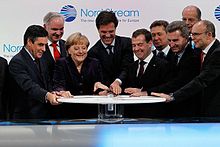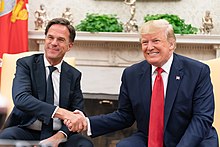Mark Rutte
After originally embarking on a business management career working for Unilever, Rutte entered national politics in 2002 as a member of Jan Peter Balkenende's cabinets.
He is the youngest child of Izaäk Rutte (5 October 1909 – 22 April 1988), a merchant, and his second wife Hermina Cornelia Dilling (13 November 1923 – 13 May 2020), a secretary.
Although his original ambition was to attend a conservatory and become a concert pianist,[20] he instead went to study history at Leiden University, where he obtained an MA degree in 1992.
[24] Rutte served as State Secretary (i.e. Deputy Minister) at the Social Affairs and Employment Ministry from 22 July 2002 to 17 June 2004 in the First and Second Balkenende cabinets and was responsible for fields including bijstand (municipal welfare) and arbeidsomstandigheden (Occupational safety and health).
The Municipal Executive (College van burgemeester en wethouders) of Haarlem decided to withdraw his right to social benefits.
The court ruled that "an investigation aimed exclusively at persons of Somali descent is discriminatory" and contrary to the Constitution because this distinction is "discrimination based on race".
Rutte's candidacy was backed by the VVD leadership, including the party board, and many prominent politicians such as Frank de Grave, former minister of Defence, Ivo Opstelten, the mayor of Rotterdam and Ed Nijpels, the Queen's Commissioner of Friesland.
[33] The lengthy 2010 cabinet formation followed, with several personalities succeeding each other, being appointed by Queen Beatrix in order to find out what coalition could be formed.
Instead, the only possibility appeared to be a centre-right coalition of liberals and Christian Democrats (CDA), with the outside support of the Party for Freedom (PVV), led by Geert Wilders.
The government was confirmed in office by a majority of one, and Rutte was sworn in as Prime Minister of the Netherlands, becoming the first Liberal to serve in the role since Pieter Cort van der Linden in 1918.
In March 2012, seeking to comply with requirements from the European Union to reduce the nation's deficit, Rutte began talks with his coalition partners on a budget which would cut 16 billion euros of government spending.
However, PVV leader Geert Wilders withdrew his party's informal support from the government on 21 April, stating that the proposed budget would hurt economic growth.
[39] In 2014, The Hague hosted a Group of Seven special meeting after the Malaysia Airlines Flight 17 was shot down in Ukraine with 193 Dutch nationals aboard.
[citation needed] In April 2016, Rutte was appointed by United Nations Secretary-General Ban Ki-moon and President of the World Bank Group Jim Yong Kim to the High-Level Panel on Water.
In November 2016 the House of Representatives approved a ban on the Islamic burqa in some public spaces including schools and hospitals by 132 votes against 18, which the VVD supported.
In July of that same year, Rutte became a topic in international news by interrupting and explicitly contradicting the American president Donald Trump during a meeting with the press at the Oval Office in the White House, which was considered to be "typical Dutch bluntness".
[45][46] At the 2019 provincial elections, Rutte's VVD suffered a blow following the victory of right-wing populist newcomer Forum for Democracy (FvD).
[47] During the negotiations for the COVID-19 recovery fund in the European Union in 2020, Rutte was considered the unofficial leader of the Frugal Four,[48] demanding loans instead of grants and more conditions on them.
[citation needed] In September of that year, Rutte suggested that the EU could be dissolved and re-formed without Poland and Hungary, as he perceived these countries' governments to be dismantling the rule of law.
[54] After remaining as outgoing prime minister for the duration of the longest formation process in Dutch history he presented a coalition agreement with D66, CDA and CU, the same combination as his previous government, on 15 December 2021.
[58] The scandal also damaged his campaign promises and the coalition accords, which stated that the cabinet wished to restore peoples faith in politics, create a new governance culture and "improve the information provided to the House".
[63][64] The king asked that the prime minister and his government "continue to carry out the duties they consider necessary to the interests of the Kingdom in a caretaker capacity".
[70] He rejected calls for a ceasefire in the Israel–Hamas war but supported "humanitarian pauses" to provide aid to civilians in the Gaza Strip.
[74] He would travel to Paris on the 26th of February, where Emmanuel Macron was hosting an emergency summit concerning the situation in Ukraine, which had suffered the loss of Avdiivka due to a lack of available ammunition.
[76] On 1 March Rutte increased the commitment to €250 million for Fiala's venture, as he went to Kharkiv to tour an underground metro station that had been repurposed into a primary school together with Zelensky.
[77][78]Later that month, Rutte threatened Israel with sanctions if the Israeli military launched a large-scale invasion of Rafah, saying the attack would be a "game changer" and have "political consequences".
[87] Despite having previously stated that he wanted to focus on high school teaching after his prime ministership, he announced his candidacy for the position in October 2023.
[88][89][90][91] Rutte managed to overcome opposition from the last holdouts of Turkey, Hungary, Slovakia, and Romania in the months thereafter, with his only opponent, Romanian president Klaus Iohannis, dropping out a week before his official appointment on 26 June 2024.
[94] As secretary-general, Rutte called on member nations to ramp up their defense spending and production, stating that a wartime mentality was required.
[101] While he was prime minister, Rutte taught social studies on Thursday mornings at the Johan de Witt College, a secondary school in The Hague.












